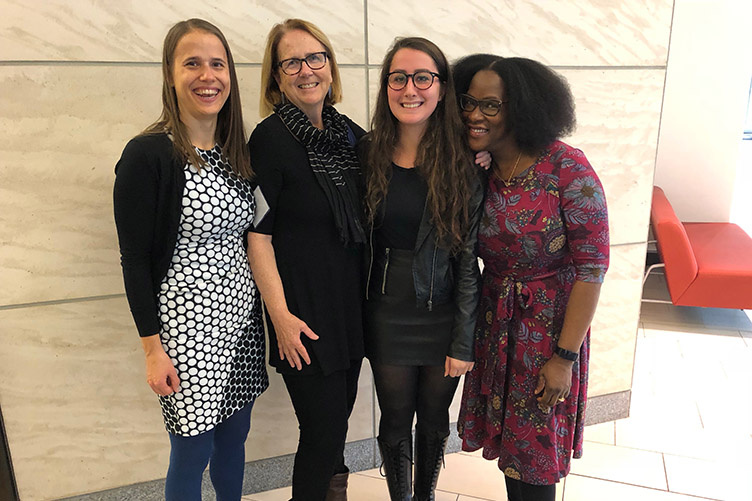
UNH professors and student at the Minds of Our Own conference at MIT: Nina Windgaetter, lecturer in philosophy; Charlotte Witt, professor of philosophy; Clio Walsh '20, philosophy major; and Subrena Smith, assistant professor of philosophy
Twenty-five years ago, the book, “A Mind of One’s Own,” broke ground in feminist philosophy, asserting Western philosophers had left out critical perspectives related to the theories of reasoning and objectivity: the perspectives of women.
Co-edited by Charlotte Witt, UNH professor of philosophy, the book includes essays on metaphysics, epistemology, philosophy of science, ethics and the history of philosophy — from a feminist perspective. Its influence also spurred the formation of The Society for Analytical Feminism. Professor Witt’s contribution to the field was recognized recently by MIT, which hosted its “Minds of Our Own” conference this past November to celebrate the groundbreaking book.

“It was exciting and humbling to see approximately 150 philosophers from all over the world convene to talk about themes from the book and their contemporary relevance,” Witt says. “What the book did was to identify a really broad range of issues that could be called feminist philosophy. People realized, ‘these experiences aren’t just ones I am having, they are the experiences lots of women are having.’”
Topics covered at the conference included intersectionality, gender identity, gender and race, and feminist approaches to the global refugee crisis, among others.
Subrena Smith, UNH assistant professor of philosophy, refers to Witt as a mentor and advisor. When invited to deliver the keynote address, “Differently Different, All the Same,” Smith says she was excited to contribute, calling Witt’s book the first to answer important philosophical questions from a feminist standpoint.
In her speech, Smith analyzed the relationship between human biology and racial identity. Witt says that many philosophers and race theorists believe that racial concepts are socially constructed and do not have a firm basis in biology or biological differences. Smith, who grew up in Jamaica before moving to England and later earning her Ph.D. at Cornell University, experienced racial identity differently in her home country compared to how it was ascribed to her after she moved to the United States.
“In my talk, I make the claim that race is socially constructed in the United States, and that it doesn’t apply to me,” Smith says.
She explains that she does not relate to the term “African American” as her racial identity, as it was not a part of her own developmental history. While her biology suggests that she has the physical features of a black, or African-American woman, Smith says that she doesn’t subscribe to being African American because she has no experience living in that construct. As a philosopher of science, Smith argues that human beings are formed in the context of their environment and social structure.
“I argue that the matter of race for me as experienced in the United States has been very hard on multiple levels. Ostensibly, I have all of the relevant features that characterize African Americans, but I am not,” Smith says. “In the United Sates, certain things come with the culture of blackness here that are absent for me. I was never enculturated in the African-American way of being. It’s easy for me to meet a black person and for that person to wrongly assume that we have lots things in common because of what I look like.”
Witt says that Smith’s argument about biology and race are analogous to arguments related to biology and gender. Both race and gender are socially constructed categories, rather than biological ones, she asserts.
What the book did was to identify a really broad range of issues that could be called feminist philosophy. People realized, ‘these experiences aren’t just ones I am having, they are the experiences lots of women are having.’”
“It’s important to distinguish gender differences from biology. Gender is related to how people are expected to act in a social context, separate from biology. Many people also think that the idea of race is social — not a biological division of individuals. They are parallel in the same way,” Witt says.
UNH junior Clio Walsh, a philosophy and psychology major, attended the conference to listen to Smith’s address.
“Professor Smith’s talk spoke to issues that have long been present in philosophy and society, but have yet to be satisfactorily answered,” Walsh says. “It was enlightening to hear her explain this ‘different’ conception of race addressing both biological and social influence. I think this new understanding will impact the current conversation and challenge people to look critically at the beliefs they hold.”
More than two decades later, feminist philosophers are still grappling with difficult social issues such as racism and sexism. Feminist philosophy provides a critical perspective on broad political questions including global injustice, Witt says. Recent social and political events show there is still a long way to go.
“#Metoo has just been in the last year and a half. Floods of women have been stepping forward with regard to sexual harassment and assault. We’ve also seen a little more revival of feminist energy and focus and important issues crystalized in people’s minds,” Witt says.
-
Written By:
Krysten Godfrey Maddocks '96 | College of Liberal Arts | krysten.godfreymaddocks@unh.edu

















































